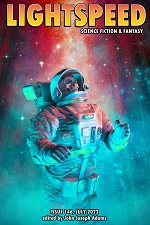“Critical Mass” by Peter Watts
“Liberty: Seeking Support for a Writ of Habeas Corpus for a Non-Human Being” by Samuel Peralta (reprint, not reviewed)
“Singing the Ancient Out of the Dark” by R J Theodore and Maurice Broaddus
“Ursus Frankensteinus” by Rich Larson
“The Rustle of Growing Things” by Isabel Cañas
“An Old Man Cometh and He Is Overgrown” by Lyndsie Manusos
“The Sun in Exile” by Catherynne M. Valente (reprint, not reviewed)
“Hungry as the Mirror Bright” by Micah Dean Hicks
Reviewed by Victoria Silverwolf
Half a dozen original works of imaginative fiction appear in this issue.
Set in the near future, “Critical Mass” by Peter Watts deals with an artist/architect whose works are being vandalized by person or persons unknown. In addition to dealing with this problem, he also has a child in a medically-induced coma, waiting for a cure for her disease.
The author creates a complex future, dystopian in some ways but also featuring advanced technology that supports the work of artists. The solution to the mystery of the vandalized works is a clever one, and is fairly clued so the reader can match wits with the protagonist. However, the story is much more than merely a whodunit. It features fully developed characters with unusual emotional depth. The various forms of speculative technology featured throughout the story are highly plausible, creating a believable futuristic setting.
The protagonist of “Singing the Ancient Out of the Dark” by R J Theodore and Maurice Broaddus travels to a planet in order to investigate a dying human colony. After evading the vessel that guards the world from intruders, she encounters an inhabitant of the colony and learns its secrets.
Perhaps because this is a collaborative work, the story is disjointed, both in style and content. Traditional narrative alternates with transcripts of the protagonist’s visual diary. The mood of the story changes from hard science fiction or space opera to almost pure mysticism, which remains opaque.
“Ursus Frankensteinus” by Rich Larson is a very brief account of an attempt to save polar bears from extinction through the use of genetic engineered microorganisms that slow down the animals’ metabolism. As one would expect, this doesn’t work out well.
The effect of this dark little joke story depends almost entirely on its punchline. Readers may find it amusing, if not terribly plausible.
“The Rustle of Growing Things” by Isabel Cañas is also an extremely short tale. A woman who wishes that her man would not leave her in order to go off to war experiences plants growing over their bodies as they lie together.
The story can be interpreted as a dream or as magic realism. In either case, it consists almost entirely of vivid description, with little plot.
“An Old Man Cometh and He Is Overgrown” by Lyndsie Manusos takes place in a fantasy world where so-called summoners work magic. After a man’s wife dies, he uses this power to create a simulacrum of her, causing parts of his soul to separate from his body as well. His adopted child arrives to deal with the situation, which has unwelcome effects on the town where he lives.
The characters are interesting and relatable, particularly the mayor of the town, who is the most likable person in the story. The way magic works in this universe is not always clear. Sometimes it involves cutting one’s hair, as a sort of burnt offering, sometimes not. A vehicle in which the protagonist rides is steam-powered and semi-automated. This touch of steampunk seems out of place in an otherwise typical fantasy setting.
The main character in “Hungry as the Mirror Bright” by Micah Dean Hicks appears to be some sort of insect. She wishes to join the band of fairies, but is rejected by their queen. Banished to a mundane existence, she finds an unexpected ally, and has another meeting with those who threw her out.
Put this way, the story sounds whimsical. In fact, the mood is very serious. The work is most notable for the author’s unusual style, which is full of uncommon phrases and metaphors. Some readers are likely to appreciate this exotic way of writing, while others may find it affected.
Victoria Silverwolf successfully bought some sliced sourdough bread this morning, after failing to do so two days in a row.
 Lightspeed
Lightspeed